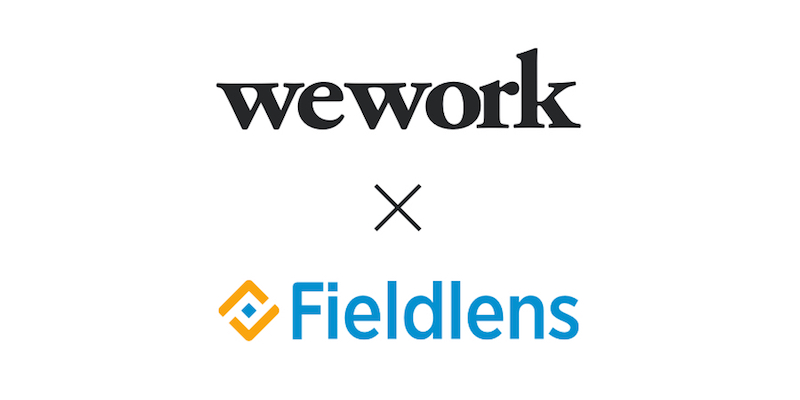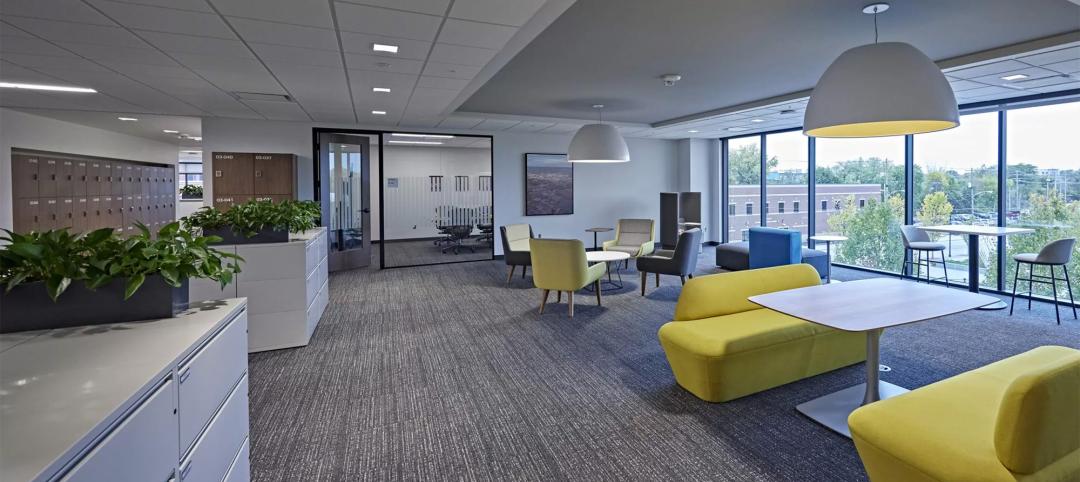WeWork, the New York-based urban workspace designer and redeveloper that’s one of the fastest-growing companies in the U.S., has acquired Fieldlens, a six-year-old producer of construction management applications that allow for more efficient on-site communications.
Most construction projects “are broken social networks,” says Doug Chambers, Fieldlens’ founder. His company’s app helps make a jobsite environment more like Facebook or a social feed, where everyone on site is communicating in real time, all the time.
An example Chambers gives is a project manager who is walking a site, and using the app on his smartphone to send observations, pictures, confirmations, and directives to other crew members. Chambers says that on one jobsite in Buffalo, N.Y., the Fieldlens app is facilitating 1,000 interactions per day, on average, among the 80 to 100 workers on site.
“Fieldlens lets people get back to work,” and not get bogged down on a lot of administrative and paperwork duties, says Chambers.
For the past two years, WeWork has been one of Fieldlens’ biggest customers. And its use has “ramped up pretty rapidly” over the past six months, says Chambers, as WeWork “has grown like crazy.”
Founded in 2010, WeWork currently has more than 120,000 members globally working out of 149 locations in 45 cities in 13 countries. WeWork so far has redeveloped more than 8 million sf of space to coworker offices. It is about to expand into India and Colombia.
In a recent blog, WeWork’s Chief Product Officer David Fano said the company is opening between five and 10 new locations a month. “And we’ve only begun to scratch the surface of global demand.” The company has also recently expanded into co-living redevelopment.
“WeWork is a train moving at 200 miles per hour,” says Aaron Fritsch, WeWork’s head of product systems and operations. “We’re a mission-driven company, and what we love about Fieldlens is how it’s focused on changing and improving the industry. It saw that there’s a better way that [project management] could be done.”

WeWork had been one of Fieldlens' biggest customers before it acquired the six-year-old company this month. Image: WeWork
Fano said that WeWork is “obsessed by the intersection of technology and the construction industry.” And among the things that Fieldlens’ app brings to the table, says Fristch, is a continuous feedback loop that bridges the communications gap that too often separates not only jobsite personnel, but also designers and facilities managers.
As a single company WeWork and Fieldlens will continue to develop and refine construction tools that are made available to the industry at large. “As part of WeWork, we’ll have more resources to continue to focus on our goal of making the work-lives of construction professionals more efficient,” says Chambers.
Related Stories
High-rise Construction | Jul 29, 2024
Safdie Architects’ Shanghai office tower features glass-enclosed corner garden that ascends the 35-story structure
Safdie Architects has announced the completion of LuOne Mixed-Use Complex—a business, retail, and entertainment development in the Luwan district of Shanghai, China. The mixed-use complex consists of an eight-level retail galleria, which opened in 2018, and a 35-story office tower, which recently reached completion.
Smart Buildings | Jul 25, 2024
A Swiss startup devises an intelligent photovoltaic façade that tracks and moves with the sun
Zurich Soft Robotics says Solskin can reduce building energy consumption by up to 80% while producing up to 40% more electricity than comparable façade systems.
Great Solutions | Jul 23, 2024
41 Great Solutions for architects, engineers, and contractors
AI ChatBots, ambient computing, floating MRIs, low-carbon cement, sunshine on demand, next-generation top-down construction. These and 35 other innovations make up our 2024 Great Solutions Report, which highlights fresh ideas and innovations from leading architecture, engineering, and construction firms.
Office Buildings | Jul 22, 2024
U.S. commercial foreclosures increased 48% in June from last year
The commercial building sector continues to be under financial pressure as foreclosures nationwide increased 48% in June compared to June 2023, according to ATTOM, a real estate data analysis firm.
Sponsored | Office Buildings | Jul 17, 2024
Unlocking Sustainability: Smart Access in the Coworking Space
Smart building technologies, including modern access control systems, are transforming coworking spaces by advancing sustainability initiatives and offering new ways to create and operate efficient working spaces. Learn more about the benefits of eco-friendly practices, from reducing carbon emissions to cutting operating costs, and discover how choosing the right partners can amplify your green efforts.
Adaptive Reuse | Jul 12, 2024
Detroit’s Michigan Central Station, centerpiece of innovation hub, opens
The recently opened Michigan Central Station in Detroit is the centerpiece of a 30-acre technology and cultural hub that will include development of urban transportation solutions. The six-year adaptive reuse project of the 640,000 sf historic station, created by the same architect as New York’s Grand Central Station, is the latest sign of a reinvigorating Detroit.
Government Buildings | Jul 8, 2024
GSA adopts new accessibility guidelines for federal properties
The U.S. General Services Administration (GSA) adopted a new rule with new accessibility guidelines for federal buildings. The rule establishes that pedestrian facilities in the public right-of-way are readily accessible to and usable by people with disabilities.
Office Buildings | Jul 8, 2024
Office vacancy peak of 22% to 28% forecasted for 2026
The work from home trend will continue to put pressure on the office real estate market, with peak vacancy of between 22% and 28% in 2026, according to a forecast by Moody’s.
Office Buildings | Jul 1, 2024
Mastering office layouts: 5 primary models for maximum efficiency and productivity
When laying out an office, there are many factors to consider. It’s important to maximize the space, but it’s equally important to make sure the design allows employees to work efficiently.
Smart Buildings | Jul 1, 2024
GSA to invest $80 million on smart building technologies at federal properties
The U.S. General Services Administration (GSA) will invest $80 million from the Inflation Reduction Act (IRA) into smart building technologies within 560 federal buildings. GSA intends to enhance operations through granular controls, expand available reporting with more advanced metering sources, and optimize the operator experience.

















